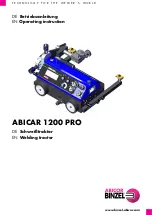
Speidel's Braumeister
Page 10 of 32
exposed to the danger of infection which can spoil the beer and means all the work
was for nothing. So take particular care that containers (fermenting vessel, bottles) and
utensils (ladle, valves, gaskets) are absolutely clean. Sulphurous acids or similar are
particularly suitable for disinfecting these containers and utensils. These are available
in specialist vintners’ and home-brewing shops. The powder is mixed with water and
diluted and is suitable for filling the airlock, for disinfecting the fermenting vessel,
other tools and equipment and even one's hands. It is recommended to prepare, for
example a bucket of sulphurous acid, where one's hands and the equipment can be
disinfected during brewing and before decanting. The fermenting vessel is sealed with
a little sulphurous acid inside and left standing for several hours. Now and then give
the container a shake and before use empty it and allow to drip dry. Rinsing with water
is not necessary. A few drops or remains of sulphurous acid in the beer are completely
harmless. Disinfecting storage and maturing kegs is done the same way as with the
fermenter. If the beer is bottled for maturing and storing in swing-top bottles after
fermenting, the bottles are heated in the kitchen oven to disinfect them. The rubber
seals are removed and boiled in water or washed in sulphurous acid. The bottles are
heated in the kitchen oven to a temperature of approximately 130°C. Afterwards, let
the bottles cool down to room temperature in the switched-off oven and close them
with the disinfected seals. This guarantees that the fermented beer is bottled in
absolutely clean bottles. This should be done several days before the fermentation
finishes so that the bottling process can be carried out quickly but without fuss or
rushing.
11.8 Notes on the double cooling jacket and water quality
In order to achieve optimum cooling, cold water should be used as the coolant. The
greater the temperature difference between cooling water and wort temperature, the
quicker cooling takes place. What is known as the "whirlpool effect" makes the wort
move in a circle, which likewise accelerates cooling (on this see Section on
"Cooling").
In order to avoid corrosion damage, blockages or bacterial growth in the double jacket,
only clean water/cooling medium free of iron particles should be used. Consequently,
avoid steel pipes/ fittings or similar in the feed line to the double jacket. Before use, it
might be necessary to have the water analysed. You can protect your system against
the entry of dirt or iron particles with sieves or filters.











































